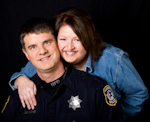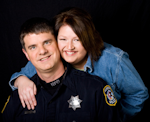How important is higher education to future success as a police officer? Should new hires possess a college degree, as more and more police departments are requiring, and should existing cops be encouraged to pursue degrees if they don’t already? Might greater education among officers enhance the professionalism of policing and diversity of those who wear the badge and, in turn, better serve an increasingly diverse and demanding culture?
Or are street smarts, common sense, and a solid course of study through the “School of Hard Knocks” good enough?
These questions (and occasionally raucous debate they prompt) aren’t new. As far back as the 1930s there have been calls for police agencies to require some level of higher education as a means to professionalize their operations, better understand and meet the needs of their communities, and improve their public image in the wake of high profile crime and crime fighting through the 20s and 30s. This was a far cry from the early years of the 20th Century, just a few decades before, when few police officers had even a high school diploma. That the United States was rapidly modernizing and diversifying became obvious through the 60s, 70s, and 80s, and the idea of higher education for police officers as a means of meeting the evolving challenges they faced grew. In the early 1970s Universities received grants from the Law Enforcement Assistance Administration to create and expand research and academic programs in the fields of Criminal Justice and Criminology, and many students received financial assistance through the Law Enforcement Education Program to attend college to study in these fields. Today, criminal justice, criminology, and law enforcement administration programs, or as concentrations under other academic disciplines such as sociology, are highly popular.
Today the number of police agencies requiring education beyond high school is still a significant minority. Larger police departments are more likely to require their officers have at least some college, often an Associate degree or equivalent, and a small minority will only consider applicants with a minimum of a Bachelor’s degree. Still, many young officers today do enter the profession with some college under their belt, many with a BA or BS, and some with more advanced degrees. It’s a trend that probably won’t slow and likely will pick up; if a hiring board is choosing between two candidates, one with a degree and one without, which will be a more competitive candidate with all other factors being equal?
This has produced a cultural shift in many departments, sometimes with all the angst and sniping such change brings as the old guard (street smart, “SoHK” types) work in close quarters with the new breed (book smart, diversity conscious, and theory driven). Usually, and given enough time, the rookies become seasoned and street smart, too, and learn there is wisdom by the ton to be gleaned from those who’ve perfected their craft from decades of trial and error. Honoring diversity means honoring the varied experiences of a wide range of backgrounds and points-of-view.
Many outstanding police officers have served honorably without ever stepping foot in college. There are certainly more yet to become cops. Many young officers follow a more traditional route, segueing from military service to civilian policing (with many also financing college studies from their service). Our purpose here is not to denigrate either route; real world experience and gut-level savvy carry a lot of weight, and the armed forces are second-to-none at transitioning green kids into outstanding men and women at top speed.
Of course, we’re both proponents of higher education and believers in the advantages it can bring. What we want to do is twofold: first, to highlight the advantages of continuing with higher education no matter your stage in life and career, and how it can improve both a personal skillset and service provision and, next, to briefly discuss some of the traditional and modern ways to study.
Why Higher Education for Cops?
An enduring view of college is that its primary function is job of career training. This viewpoint, in our opinion, while not entirely wrong, misses the larger and more intrinsic value of education. Of course, if you ask most young adults why they are heading off to university they’ll tell you some version of, “To prepare for a good career.” This is a major function of many if not most institutions and programs, and the exposure to and practice in advanced theories, skills, and processes is critical for career minded students.
Most, however, also come to see how, if approached in the right frame of mind and under the guidance of skilled instructors, their educations broaden horizons and expand worldviews, expose them to ideas they’d likely never consider and people whose experience and points-of-view are in stark contrast to their own, critically assess these foreign ideas and their own, and intellectually mature. They learn not so much what to think and do, but how to think critically to arrive at conclusions and solutions.
Police officers can benefit from the same combination of practical skill development, exposure to theory and thought, and development of critical analysis both pre-hire and when already on the job. Courses of study need not even follow the traditional academic paths taken by many cop – typically criminal justice, sociology, psychology, or similar – as the skills and intangibles of all disciplines can be tapped, and a diversity of people only makes law enforcement a stronger profession. I’ve known and worked with highly skilled and effective officers whose college majors have included CJ and sociology, business, accounting, engineering, biology, chemistry, music, computer science, and theater, to name just a few. Whether you aspire to be a cop or already have years on the job, the benefits of continuing advanced study can enhance you both personally and professionally.
More options than ever before
We both received our degrees, both undergrad and graduate, through the classic “bricks and mortar” experience. Of course, when we each first “went away” to college right out of high school there was little option. The traditional classroom is still favored by many and has a number of advantages over newer styles of learning: face-to-face learning in the presence of an instructor and classmates, with the benefits of live, real-time interaction and debate; structured class time and due dates for assignments and exams; the resources of the school close at hand; networking and relationship development with instructors and classmates; and the energy drawn off simply being on a college campus. But this experience isn’t for everyone and for some the structure of the traditional campus conflicts with demands of work and family. Fortunately, tradition can be set aside!
Cohort programs
A close cousin to the traditional cafeteria style of course selection still popular, learning cohorts increase the structure by placing students within groups matched along certain similarities, establish proscribed learning objectives and paths, and strive to keep the original group of students connected throughout the program from start to graduation. Although the structure is increased, there may be greater flexibility overall as the cohort of students works together to help each other reach their learning objectives and goals, and instruction can be responsive to unique needs of the group or individuals.
Online learning
Online learning opportunities are abundant and growing, not just in number and popularity but also credibility and quality. It is now possible to attend an accredited and renowned university several states away from the comfort of your home. While not as personal as more traditional learning, many schools (and students) have become creative in building community, maximizing interactions with faculty and classmates, and personalizing the learning experience. Plus, these can be perfect for someone who is a motivated self-starter in need of flexibility.
Be careful to vet online programs; they can be expensive and not all schools and programs are created equal, or have equal value. Is the school and program accredited? What is their reputation? Can you mix traditional classroom with online learning, or do you need to choose between the two?
MOOCs
A relatively new and interesting development in distance learning are Massive Open Online Courses, Or MOOCs, that have emerged as a way to offer free online learning, open to anyone with a computer and internet access. MOOCs use traditional lectures, readings, video, problem sets, and community forums to facilitate learning. While they don’t lead to a degree, and the work and time commitment can be significant, many do offer certificates of completion and originate from world-class universities. The possibilities of MOOCs are still being discovered.
The benefits of education on individual cops and the law enforcement profession must not be forgotten. If you have a chance to learn, whether it leads to a degree or not, consider grabbing it. Education is something that, once attained, cannot be taken from you and may benefit you in ways you never imagined.

Michael Wasilewski
Althea Olson, LCSW and Mike Wasilewski, MSW have been married since 1994. Mike works full-time as a police officer for a large suburban Chicago agency while Althea is a social worker in private practice in Joliet & Naperville, IL. They have been popular contributors of Officer.com since 2007 writing on a wide range of topics to include officer wellness, relationships, mental health, morale, and ethics. Their writing led to them developing More Than A Cop, and traveling the country as trainers teaching “survival skills off the street.” They can be contacted at [email protected] and can be followed on Facebook or Twitter at More Than A Cop, or check out their website www.MoreThanACop.com.

Althea Olson
Althea Olson, LCSW and Mike Wasilewski, MSW have been married since 1994. Mike works full-time as a police officer for a large suburban Chicago agency while Althea is a social worker in private practice in Joliet & Naperville, IL. They have been popular contributors of Officer.com since 2007 writing on a wide range of topics to include officer wellness, relationships, mental health, morale, and ethics. Their writing led to them developing More Than A Cop, and traveling the country as trainers teaching “survival skills off the street.” They can be contacted at [email protected] and can be followed on Facebook or Twitter at More Than A Cop, or check out their website www.MoreThanACop.com.


